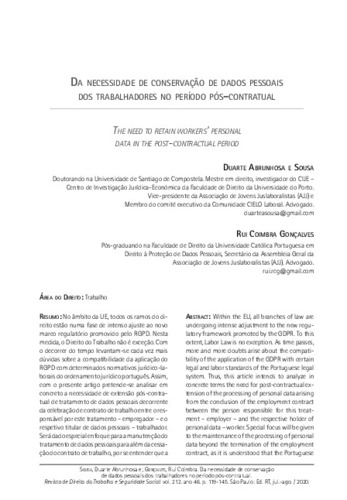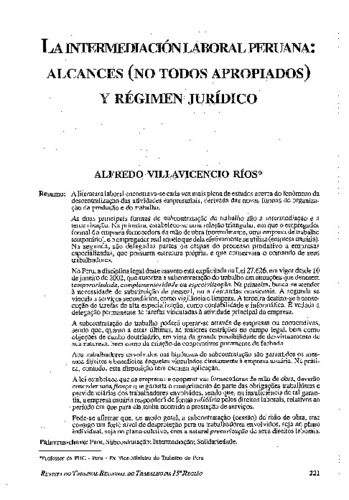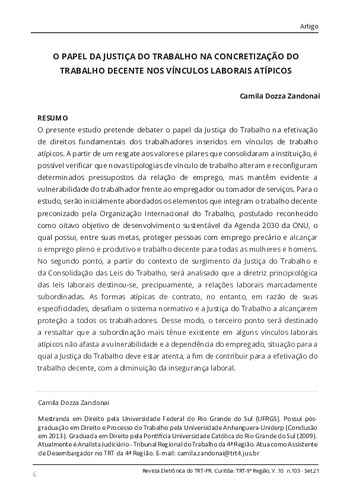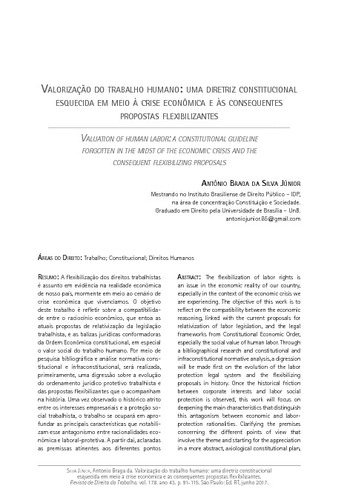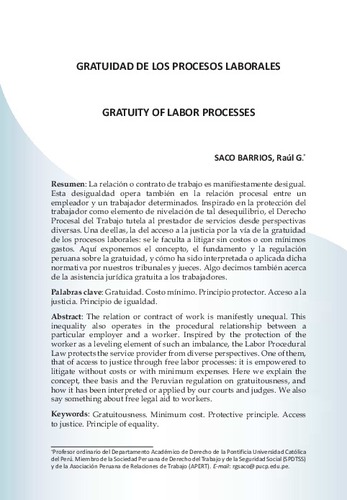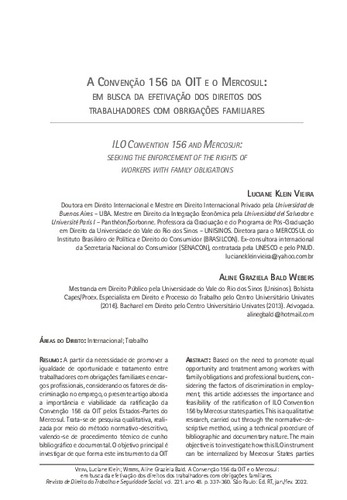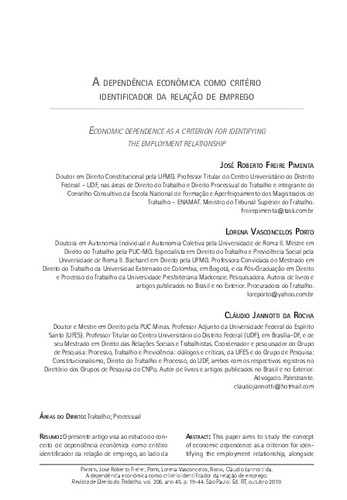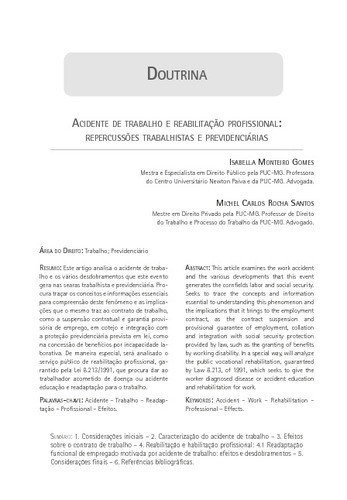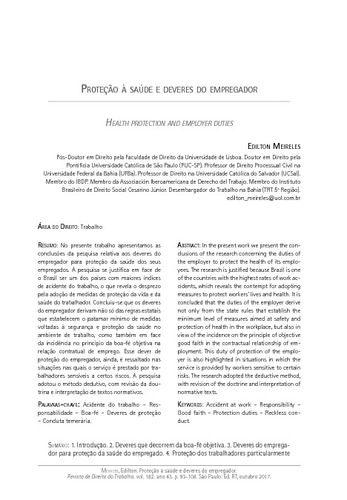Artigo de periódico
Os regimes especiais de trabalho: o arquipélago normativo peruano
| dc.contributor.author | Canessa Montejo, Miguel F. | |
| dc.date.accessioned | 2024-08-13T17:29:26Z | |
| dc.date.available | 2024-08-13T17:29:26Z | |
| dc.date.issued | 2024-04 | |
| dc.identifier.citation | CANESSA MONTEJO, Miguel F. Os regimes especiais de trabalho: o arquipélago normativo peruano = Special schemes of employment: the Peruvian regulatory archipelago. Revista trabalho, direito e justiça, Curitiba, v. 2, n. 1, p. 271-308, jan./abr. 2024. | pt_BR |
| dc.identifier.uri | https://hdl.handle.net/20.500.12178/236211 | |
| dc.description.abstract | [por] Analisa os critérios e limites de regimes especiais de trabalho, considerada a previsão do art. 103 da Constituição do Peru. O estudo reconhece o problema de que cada vez menos assalariados peruanos estão sujeitos ao regime geral, sendo alocados em algum dos normativos que compõem o arquipélago normativo peruano, que impõe distinção e subtrai proteção que deveria ser garantia estatal. A partir de revisão de bibliografia, legislação e jurisprudência peruana, o estudo investiga os limites normativos desses regimes, analisando a validade no plano interno constitucional e internacional, dentro dos contornos do princípio da não regressividade e direitos humanos laborais. Discorre assim sobre igualdade e proteção estatal, criticamente analisada a distinção normativa produzida sob o mote de promoção de emprego. Assinala que o arquipélago normativo sustenta situação desigual que descura do caráter finalista e axiológico do ordenamento jurídico, sendo reflexo do triunfo jurídico da racionalidade instrumental. Respalda a investigação em dados estatísticos e gráficos quantitativos, analisando em especial três regimes especiais que envolvem: i) trabalhadores da exportação não tradicional (Decreto-Lei n. 22.342); ii) trabalhadores rurais (Lei n. 27.260); e, iii) trabalhadores em micro e pequenas empresas (Lei n. 28.015). A partir desses dados, apura-se a arbitrariedade normativa do legislador peruano, nem sempre reparada por decisões do tribunal constitucional, apesar de contundentes argumentos de alguns juízes dessa corte. Defende seja condicionado o regime especial sempre à proteção do trabalhador, limitando tratamentos distintos, que devem ser limitados estritamente a situações de justificativa objetiva e razoável. | pt_BR |
| dc.description.abstract | [eng] This article analyzes the criteria and limits of special employment schemes, considering the textual statement of art. 103 of the Constitution of Peru. The study recognizes the problem that fewer and fewer Peruvian employees are subject to the general scheme of employment, being allocated to one of the regulations by the Peruvian normative archipelago, which imposes distinction and diminishes labor protection that should be a state guarantee. Based on a review of Peruvian bibliography, legislation and jurisprudence, the study investigates the normative limits of these employment schemes, analyzing their validity at the internal constitutional and international level, within the contours of the principle of non-regressivity and labour human rights. Thus, equality and state protection are discussed, critically analyzing the normative distinction produced under the motto of employment promotion. It points out that the normative archipelago sustains an unequal situation that neglects the finalist and axiological character of the legal system, being a reflection of the legal triumph of instrumental rationality. It supports the investigation with statistical data and quantitative graphics, analyzing in particular three special regimes that involve: i) non-traditional export workers (Decree-Law n. 22,342); ii) rural workers (Law No. 27,260); and, iii) workers in micro and small companies (Law n. 28,015). Based on these data, the article aims to outline the normative arbitrariness of the Peruvian legislator, which is not always repaired by the Constitutional Court’s decisions, despite strong arguments from some judges. It advocates that the special regime should always follow the frontier of workers’ protection, limiting different treatments, which must be strictly used to situations with objective and reasonable justification. | pt_BR |
| dc.description.tableofcontents | O regime especial de trabalho e seus limites jurídicos -- Os regimes especiais de trabalho na legislação peruana: O regime de trabalho da exportação não tradicional. O regime de trabalho rural. O regime de trabalho de micro e pequenas empresas -- Considerações finais: o impacto dos regimes especiais de trabalho peruano | pt_BR |
| dc.language.iso | pt_BR | pt_BR |
| dc.relation.ispartof | Revista trabalho, direito e justiça: vol. 2, n. 1 (jan./abr. 2024) | pt_BR |
| dc.subject | Direito do trabalho, Peru | pt_BR |
| dc.subject | Legislação trabalhista, Peru | pt_BR |
| dc.subject | Jurisprudência trabalhista, Peru | pt_BR |
| dc.subject | Trabalhador, legislação, Peru | pt_BR |
| dc.subject | Trabalho rural, Peru | pt_BR |
| dc.subject | Direitos humanos, proteção, Peru | pt_BR |
| dc.title | Os regimes especiais de trabalho: o arquipélago normativo peruano | pt_BR |
| dc.title.alternative | Special schemes of employment: the Peruvian regulatory archipelago | pt_BR |
| dc.type.genre | Artigo de periódico | pt_BR |
| dc.identifier.rvbisys | 001266018 | |
| dc.relation.ispartoflink | https://hdl.handle.net/20.500.12178/234157 | pt_BR |
This item appears in the following Collection(s)
-
Artigos9527



